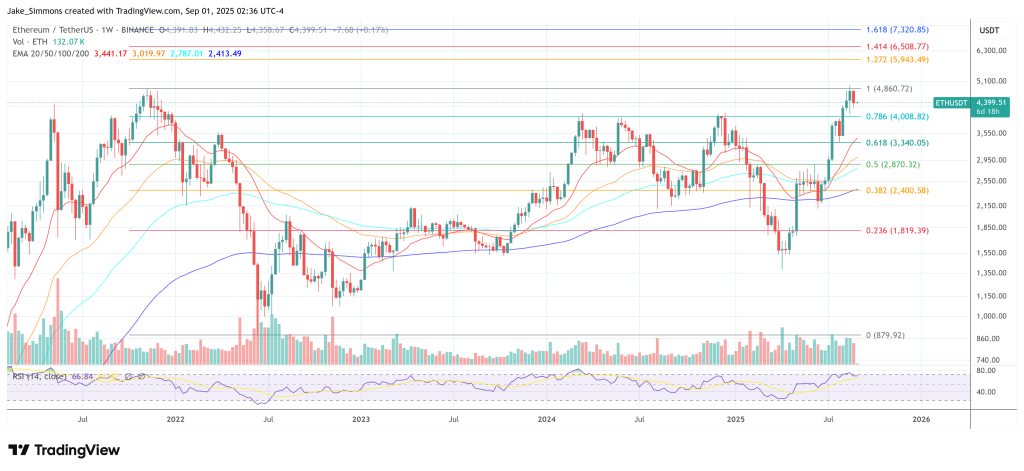Motive to belief
Strict editorial coverage that focuses on accuracy, relevance, and impartiality
Created by trade consultants and meticulously reviewed
The best requirements in reporting and publishing
Strict editorial coverage that focuses on accuracy, relevance, and impartiality
Morbi pretium leo et nisl aliquam mollis. Quisque arcu lorem, ultricies quis pellentesque nec, ullamcorper eu odio.
Ethereum co-founder and ConsenSys CEO Joseph Lubin ignited ETH discourse on August 30 with an unusually expansive thesis concerning the community’s financial and institutional trajectory, arguing that Wall Avenue will migrate its core infrastructure onto Ethereum rails and that ETH “will seemingly 100x from right here,” in the end “flippen[ing] the Bitcoin/BTC financial base.”
“I’m 100% aligned with virtually all of what Tom @fundstrat says right here,” Lubin wrote, earlier than mapping out a future wherein main monetary companies “stake, run validators, [and] function L2s/L3s,” construct DeFi publicity and “write sensible contract software program for agreements, processes and monetary devices.”
Associated Studying
He singled out JPMorgan as a financial institution already steeped in Ethereum know-how since “2014–2015.” “The one quibble that I’ve with what Tom has been saying… he’s not almost bullish sufficient,” Lubin added. “However the true drawback is that it isn’t doable to be bullish sufficient.”
Lubin’s Huge Plans For Ethereum
Lubin additionally tried to puncture a preferred narrative about scaling tradeoffs, contending that “the narrative of L2s cannibalizing L1 will very quickly be shattered.” He pointed readers to Consensys’ Linea community and a newly public “Proof-of-Burn” initiative as examples of coordination mechanisms that would strengthen Ethereum’s base layer economics slightly than dilute them.
The second leg of Lubin’s thesis centered on tokenizing Ethereum’s burn right into a transferable primitive dubbed BETH, launched final week by the Ethereum Neighborhood Basis (ECF). In follow-up posts, Lubin prodded the ecosystem to “dig into all of the ramifications of tokenizing and explicitly accounting for burned ETH,” even floating a playful incentive experiment: “Would you burn a little bit of ETH for [a @BanklessHQ] episode? … Would a few of you ship a few of that BETH to @BanklessHQ?” Past media stunts, he sketched potential demand sinks and governance makes use of: “Would there be a rising demand for BETH because it takes on signaling and voting energy in many various contexts?”
Beneath the ECF design, BETH is an immutable ERC-20 that mints 1:1 when ETH is provably destroyed. The contract forwards deposits to the canonical burn tackle and points BETH to the depositor; provide equals cumulative burned ETH by building, with no admin keys and no redemption path again to ETH. This makes burn—not issuance—the productive act that yields a brand new asset representing alignment with shortage. The reference implementation and contract tackle have been revealed by ECF alongside a weblog explainer.
Associated Studying
Lubin then speculated on spinoff layers that may emerge on high of BETH—“BBETH, BBBETH, and so on.”—as context-specific property. He analogized this to early “coloured cash” on Bitcoin, with a crucial distinction: these “shades of BETH” would reside natively in Ethereum’s token requirements and tooling, eliminating the off-chain recognition drawback that stymied first-generation experiments. “One might consider [BBETH/BBBETH] as a extra refined factor of ‘cracked ETH’… extra scarce,” Lubin wrote, suggesting video games and different constrained economies as potential testbeds.
The near-term market framing got here by way of Fundstrat’s Tom Lee, whose newest public commentary has been notably constructive on Ethereum’s institutional arc. Lee has argued that Wall Avenue’s operational stack is migrating to blockchains, that ETFs and staking rails present investable wrappers for compliance-first capital, and that Ethereum might be the “greatest macro commerce over the following ten to fifteen years.” Lubin, for his half, stated the 2 “get on calls intermittently” to coordinate technique in areas of overlap whereas “competing in extremely differentiated methods.”
At press time, ETH was buying and selling round $4,399.

Featured picture created with DALL.E, chart from TradingView.com









